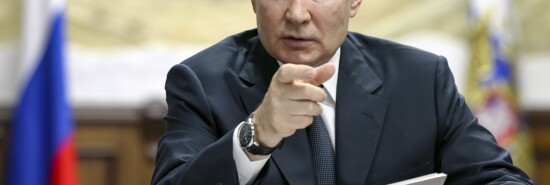
We must be astute to Russia’s imperial threat
Stanislaw Żaryn
Video Embed
“Be afraid, Old World, devoid of true beauty, true faith, true wisdom, ruled by maniacs, perverts, Satanists. Be afraid, we are coming!” So yelled Ivan Okhlobystin at a Sept. 2022 Red Square rally in support of the war in Ukraine.
Okhlobystin, an actor and Russian propagandist, argued that a “holy war” was taking place in Ukraine — one that would soon engulf the whole world. The reaction of his audience was shocking. Thousands of Russians who came to the rally applauded him, screaming approval at the top of their voices. This shows how strongly Russian society is infected with imperialism. To this day, there is widespread support among Russians for aggressive policies targeting other countries.
MUSK VS. ZUCK: HOW TWO OF TECH’S RICHEST MEN HAVE BEEN RIVALS FOR YEARS
This incident captures the essence of the problem that the Western world must face. Russian authoritarianism and imperialism not only threaten Ukraine and the countries of Central and Eastern Europe, but they threaten the entire West. Russia’s revisionist policy, backed by vicious propaganda, has already negatively affected the security of the Euro-Atlantic area. The war in Ukraine is simply another stage in the process of rebuilding a great Russian sphere of influence — an empire that is also to include NATO countries. The Kremlin has repeatedly reiterated its demands and claims for a revision of the international order formed after the Cold War, as well as the withdrawal of NATO from Central Europe.
Russian President Vladimir Putin deliberately undermined the world order as early as 2007 during his Munich speech. At that time, Putin also identified Russia’s greatest enemy: the allegedly U.S.-led unipolar world. The entire speech boiled down to the claim that Russia would not submit to Washington’s will but would rise as an independent great power. While Putin’s speech was essentially a throwing down of the gauntlet to the West, it was met with disregard and incomprehension by European countries. The lack of response from the NATO community, which continued to try to work with Russia and relativize the Russian threat, resulted in further acts of aggression by the Kremlin. What followed was Russia’s war in South Ossetia, the invasion of Georgia (August 2008), the annexation of the Crimean Peninsula (February–March 2014), and the seizure of the Donbas region, which sparked a war in April 2014.
Russia also took expansionary measures in the eastern Mediterranean (launching a military intervention in Syria on Sept. 30, 2015) and in Africa. The enthusiasm of the Russian elite was well captured by the ultra-nationalist Alexander Dugin’s statement in March 2014: “Russia will not stop in its liberation march on the territory of Crimea, nor on the Dnieper, nor even on the western borders of ex-Ukraine. Our goal is to liberate Europe from the Atlantean occupiers, the same ones who brought disaster to Kyiv and put a criminal junta in power there. Our goal is a multi-continental liberation struggle. First, the battle for Europe. Also, for the selfish purposes of securing for ourselves adequate borders, we will be forced to liberate Europe — the whole of Europe, not only Central Europe but also Western Europe.”
The internal crisis in Ukraine caused by the Euromaidan was therefore treated as a turning point enabling Russia, in Dugin’s terms, to embark on a “geopolitical march.” The next phase of the Russo-Ukrainian War, which began on Feb. 24, 2022, is yet another section of the route that the Russian state must travel to gain global power status.
Russian strategists are aware that without Ukraine, Russia does not have the necessary potential to set the pawns in place on the global chessboard. The war against Ukraine is, therefore, of paramount importance to the Kremlin. Analyses presented by Russian experts indicate that Russia must continue the war against Ukraine and intensify its aggression against the West.
It’s clear that the Kremlin is preparing for a long march and that the current war is but one stage of it.
If Moscow regains control of Ukraine, with its vast natural resources and access to the Black Sea, it will automatically regain the possibility of becoming a powerful empire linking Europe and Asia. Victory in Ukraine will allow Russia to seize the strategic initiative and increase the pressure on the trans-Atlantic community through a variety of methods, pressuring the latter to accommodate Russian interests and claims as part of a new “Concert of Europe.”
Obviously, this would be at the expense of the security of Central and Eastern European countries, and it would also undermine the position of the United States and threaten NATO’s very existence.
We must be clear: Russia’s actions against Ukraine are also a high-stakes game for the West.
CLICK HERE TO READ MORE FROM THE WASHINGTON EXAMINER
Stanislaw Żaryn is the deputy minister coordinator of intelligence services of the Republic of Poland.
